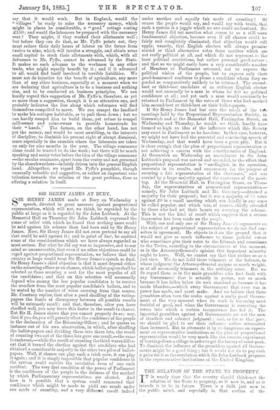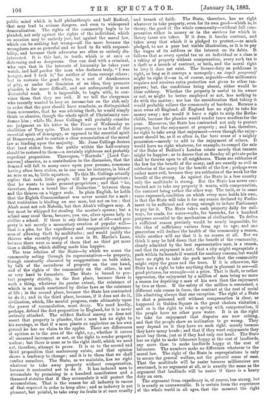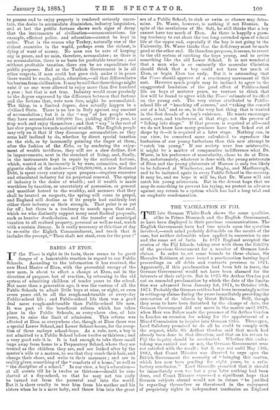THE RELATION OF THE STATE TO PROPERTY.
JT is nearly time that the country should think-out the relation of the State to property, as it now is, and as it intends it to be in future. There is a drift just now in the public mind, and especially in that section of the public mind which is half philanthropic and half Radical, that may lead to serious dangers, and even to widespread demoralisation. The rights of the community begin to be pleaded, not only against the rights of the individual, which on occasion may be entirely just, but against the moral law, which can be nothing but wrong—all the more because the wrongdoers are so powerful and so hard to fix with responsibility, and because their advocates are often so entirely dis interested. It is this last, in truth, which is at once so distressing and so dangerous. One can deal with a criminal, who says that in the interests of humanity he takes your watch, and half pardon the man who declares truly, " I was hungry, and I took it," for neither of them corrupt others ; but to restrain the good when, in a sort of drunkenness of pity, or under the dominion of an idea, they promote plunder, is far more difficult, and not unfrequently is most distasteful work. It is impossible, to begin with, to con vince them that they are evil. If we tell the clergyman who recently wanted to levy an income-tax on the rich only in erder that the poor should have comforts, as distinguished from necessaries, that he was advising theft, he would simply think us abusive, though the whole spirit of Christianity condemns him ; while Mr. Jesse Collings will probably consider our judgment on his letter in the Times of Wednesday an ebullition of Tory spite. That letter seems to us full of the essential spirit of demagogy, as opposed to the essential spirit of Democracy, and to contain a clear renunciation of the moral law as binding upon the majority. Mr. Jesse Collings desires that land stolen from the public within the half-century should be restored to them—a certainly righteous and probably expedient proposition. Thereupon, "Ruricola" [Lord Carnarvon] observes, as a contribution to the discussion, that the demand will fall in many cases upon poor persons, commons having often been stolen, as in one case he instances, in bits of an acre or so, by little squatters. To this Mr. Collings actually replies that such little people will be peasant-proprietors ; that he wants to make peasant-proprietors ; and that "he, therefore, draws a broad line of distinction" between them and the thieves on a bigger scale. In plain English, he holds that the Eighth Commandment was never meant for a mob ; that restitution is binding on one man, but not on ten ; that Ahab must not rob Naboth, but that Ahab's villagers may. A boy must be whipped for stealing the master's spoons ; but a school may steal them, because, you see, silver spoons help to civilise a school. If there is any divine law at all—and property is not merely a momentary creation of popular will— that, is a plea for the expediency and comparative righteousness of allowing theft by multitudes ; and would justify the thieves who recently stripped a man in St. Martin's Lane, because there were so many of them that no thief got more than a shilling, which shilling made him happier. The true relation of the State—by which we mean the community acting through its representatives—to property, though constantly obscured by exaggerations on both sides, by talk of the sacredness of property on the one hand, and of the rights of the community on the other, is not so very hard to formulate. The State is bound to protect property strictly, in the first place, because there is such a thing, whatever its precise extent, the existence of which is as much sanctioned by divine laws as the existence of life ; in the second place, because the State has contracted to do it ; and in the third place, because, if it does not do it, civilisation, which, like mental progress, rests ultimately upon the power of accumulation, must decay. We need hardly, perhaps, defend the first proposition in England, for it is never seriously attacked. The wildest Radical among us does not assert that property is plunder, that a man has no right to his earnings, or that if a man plants an apple-tree on his own ground he has no claim to the apples. There are differences of opinion as to the area of the right, e.g., whether it covers all unearned increment or not, or the right to render property useless ; but there is none as to the right itself, which we need not, therefore, attempt to prove. It is as to the second and third proposition that controversy exists, and that opinion shows a tendency to change ; and it is to them that we shall confine ourselves. The State, as we maintain, has no right whatever to take away property without compensation, because it contracted not to do it. It has induced men to accumulate by promising in a hundred manifestoes and a thousand statutes that if they accumulate it will protect the accumulation. That is the reason for all industry in excess of that required in order to keep alive ; and as industry is not pleasant, but painful, to take away its fruits is at once cruelty and breach of faith. The State, therefore, has no right whatever to take property, even for its own good—which is, in theory, the good of the whole community—without full com pensation either in money or in the services for which in theory taxes are taken. If it does, it breaks contract, and takes away that which it is pledged to protect,—as much pledged, to use a poor but visible illustration, as it is to pay the wages of its soldiers or the interest on its debts. It follows that as every special tax on an individual or a class is a taking of property without compensation, every such tax is a theft or a breach of contract, or both, and the moral right to levy it does not exist. The licence-duty on publicans is right, so long as it conveys a monopoly ; an imp& progressif might be right if—as is, of course, arguable—the millionaire requires and receives extra protection not given to other tax payers; but, the conditions being absent, either would be clear robbery. Whether the property is useful to its owner or not, or might be better employed or not, has nothing to do with the matter ; nor has the consideration that taking it would probably relieve the community of burdens. Because a man owns all England, all England has no right to take his money away ; nor would it have a right to strip the Rothschilds, because the plunder would render taxes needless for the year. Moreover, the State has contracted not only to protect property, but the enjoyment of property ; and has, therefore, no right to take away that enjoyment—even though the enjoyment should be, as it so often is, the bare sense of a mighty possession—merely to add to the enjoyment of others. It would have no right whatever, for example, to compel the sale of the Duke of Bedford's London estate merely that tenants might be happier ; or to decree that on Sunday all private parks shall be thrown open to all neighbours. Those are robberies of the few for the benefit of the many, and are exactly as evil as robberies of the many for the benefit of the few ; perhaps even rather more evil, because they are robberies of the weak for the benefit of the strong. As against the State in a free country only the multitude is strong. But the State has never contracted not to take any property it wants, with compensation, the contract being rather the other way. The tacit, or in some cases expressed, condition on which every man holds his own, is that the State ivill take it for any reason declared by Parliament to be sufficient and strong enough to induce Parliament to pay for it. The State takes such property daily for railways, for roads, for water-works, for barracks, for a hundred purposes essential to the mechanism of civilisation. To define a sufficient reason precisely would be nearly impossible, for the idea of sufficiency various from age to age; and one generation will declare the health of the community a reason, while another will say that it is no reason at all. But we think it may be laid down that the benefit of the community, clearly admitted by the best representative men, is a reason, and that its enjoyment is not; that a city might expropriate a park within its bounds if wanted for sanitary reasons, but would have no right to take the park merely that the community might enjoy the grass and the trees. If it is otherwise, the State has a right to take anything that is pleasant to see—all good pictures, for example—at a price. That is theft, or rather oppression, the enjoyment by a million of men being no more a reason for depriving a man of his own than the enjoyment by two or three. If the safety of the million is concerned, a different rule comes in force, the contract at the root of social life admitting always that one exception. The right of a State to shut a poisoned well without compensation is clear, as happened in Golden Square in the great cholera visitation ; and so is the right to take a spring with compensation, if the people have no other pure water. It is on the right to take for enjoyment that disputes are now arising, and that the people show an inclination to go wrong. They may depend on it they have no such right, merely because they have many heads ; and that if they want enjoyments they must buy them, just as if they had only one head. The State has no right to make labourers happy at the cost of landlords, any more than to make landlords happy at the cost of labourers. The numbers make no difference whatever to the moral law. The right of the State in expropriations is only to secure the general welfare, not the general sense of ease. That the multitude will be easier because millionaires are overtaxed, is no argument at all, or is exactly the same as the argument that landlords will be easier if there is a heavy duty on corn.
The argument from expediency is, of course, less strong, but it is nearly as unanswerable. It is certain from the experience of the whole world in all ages, that the moment the right to possess and to enjoy property is rendered seriously uncertain, the desire to accumulate diminishes, industry languishes, and at last the public fortune shows such signs of decay that the instruments of civilisation—communications, for example, efficient police, and education—cannot be kept in order. That is the reason why Turkey, naturally one of the richest countries in the world, perhaps even the richest, is dying of want of money. No man can be sure of keeping any in peace, and no man, therefore, accumulates ; as there is no accumulation, there is no basis for profitable taxation ; and .without profitable taxation, there can be no expenditure for public purposes. Bad as the Turkish Government is in all other respects, if men could but grow rich under it in peace there would be roads, police, education,—all that differentiates barbarism from civilisation. It may be said that these things might exist if no one were allowed to enjoy more than five hundred a year ; but that is not true. Industry would cease precisely to the degree expressed by the difference between that fortune and the fortune that, were men free, might be accumulated. The thing, in a limited degree, does actually happen in a civilised State. There is no law in Italy against any amount of accumulation ; but it is the way" of her people when they have accumulated 100,000 lire, yielding £200 a year, to stop work and enjoy themselves ; and that " way " is the root of her slow progress towards material wealth. The English people may rely on it that if they discourage accumulation, as they seem half inclined to do, whether by direct special taxation on the rich, or by incessantly pointing the finger at them, after the fashion of the Echo, or by rendering the enjoyment of wealth invidious, they will see a slow decline, first in improvements, next in the standard of living, and, finally, in the instruments kept in repair by the national 'fortune, which, wasted as it incessantly is by wars, calamities, and the gigantic claim of the useless—X700,000,000, a new National Debt, is spent every century upon paupers—requires excessive and stimulated industry for its perpetual renewal. The spring of industry is the desire of wealth ; and if wealth is made worthless by taxation, or uncertainty of possession, or general and manifest hatred to the wealthy, and menaces that they shall be treated as suspects, the spring will cease to propel, and England will decline as if its people had suddenly lost either their industry or their strength. That point is as yet far off ; but there is a tendency to march upon that road, which we who distinctly support many most Radical proposals, such as heavier death-duties, and the transfer of municipal taxation to all realised property, personal as well as real, watch with a certain dismay. Is it really necessary at this time of day to re-write the Eighth Commandment, and teach that it includes the precept," Thou shalt not steal, even for the poor ?"








































 Previous page
Previous page